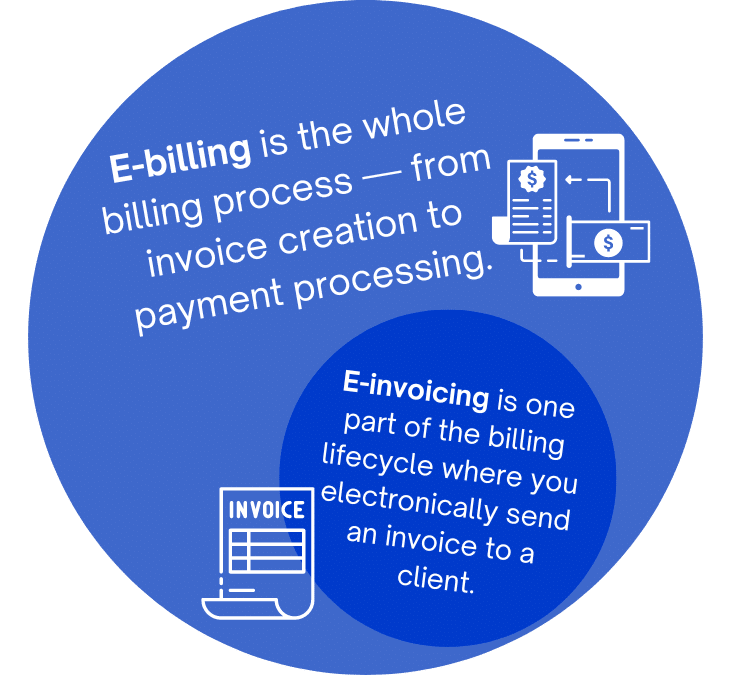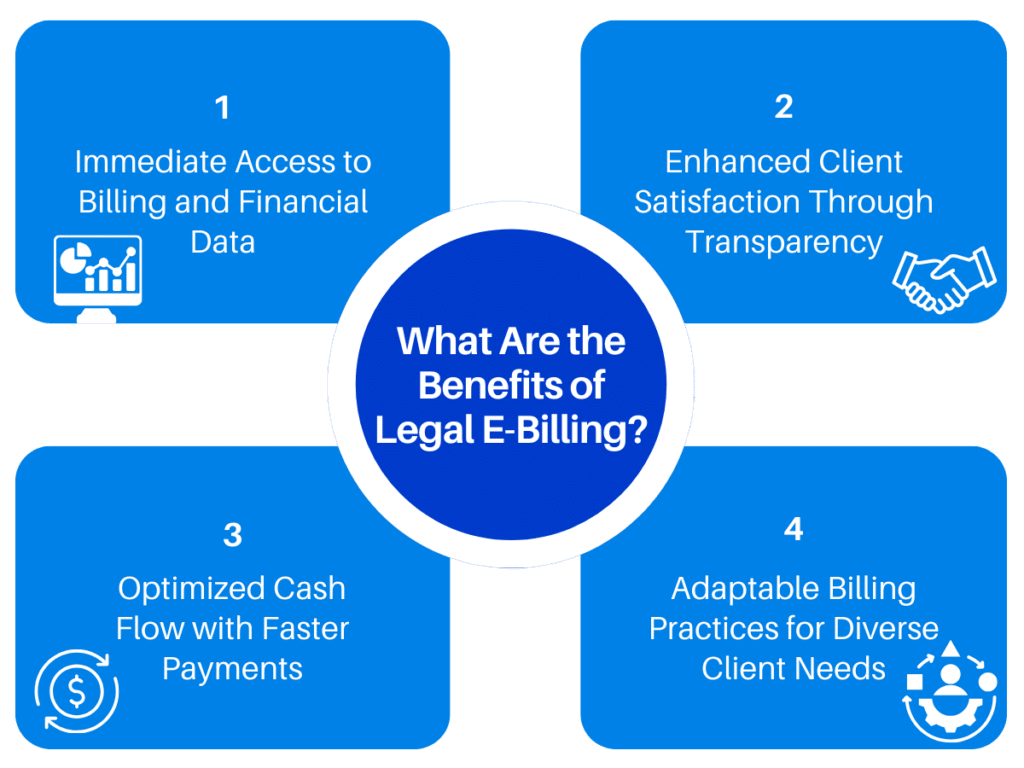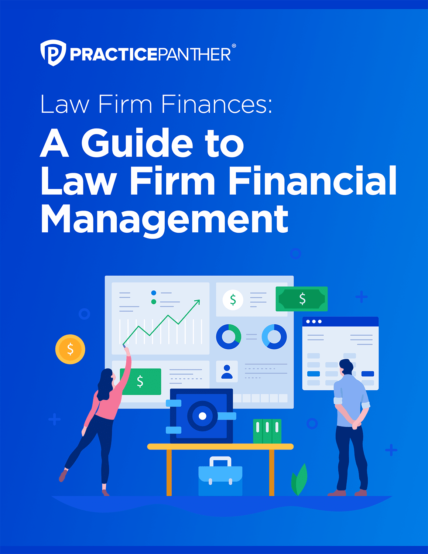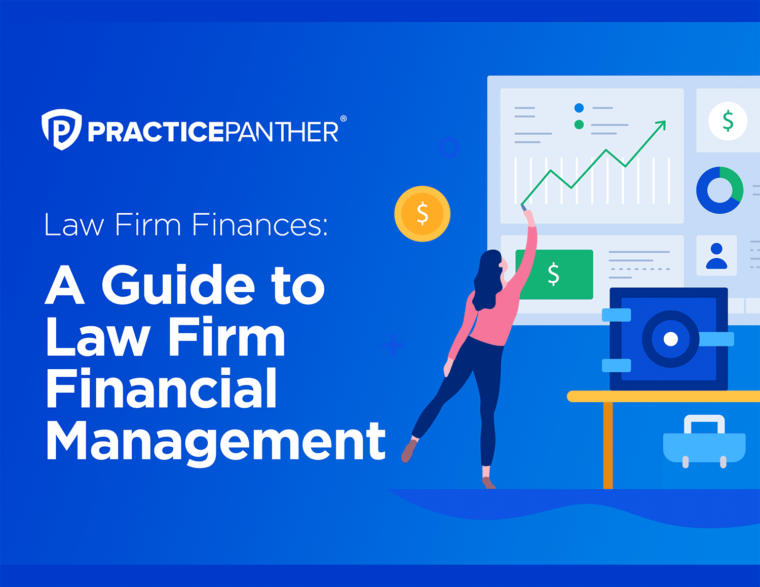Legal billing software stands out as a top choice for law firms looking to improve their operations — and legal e-billing software builds on that idea with added convenience.
With the right technology, law firms can simplify and organize their billing in a way that works for them, using software that’s both desktop and mobile-friendly. But not every billing software is created equal; only the best e-billing app will streamline the practice of law in a way that saves time, money, and stress for busy attorneys who stay on the move.
Keep on reading to learn the basics of e-billing: the advantages, how it saves you time, what features you should expect, and how to use an e-billing portal. You’ll learn what to look for in billing software — and why PracticePanther’s all-in-one legal software is the best choice for your billing needs.
Let’s start with clarifying some definitions:
What Is the Difference Between E-Invoicing and E-Billing?
The main difference between these two is scope, with e-billing being the broader of the two. Where e-invoicing is a step in the billing lifecycle, e-billing is the entire process.

- E-invoicing is the process of electronically sending a specific billing document to a client.
- E-billing is the whole billing process — from invoice creation to payment processing.
The terms “invoice” and “bill” are often used interchangeably, but the term “invoice” is notably more common in business-to-business models. Consumers will often refer to “bills” when paying for a product or service, whereas businesses will call these “invoices.”
But in terms of billing software, this distinction bears more weight than semantics; it tells you what the software can (and cannot) perform. Software that’s focused on e-invoicing will most likely handle the creation and sending of an invoice — but not much else; e-billing software, on the other hand, covers the entire process from start to finish.
PracticePanther, for example, has e-billing features for law firms, covering not just time tracking and expense details, but invoice creation, follow-ups, and even payment processing. You can also use PracticePanther to handle your entire firm operations, from legal document management solutions to full practice management.
See how PracticePanther works with a free demo.
What Is an Example of E-Billing?
The most efficient way to do e-billing is through legal software that also offers time tracking; this eliminates the need for data migration when creating bills. The traditional method, involving separate platforms or documents for time tracking and invoice creation, often leads to the cumbersome task of transferring data between systems. This only consumes valuable time while also increasing the risk of inaccuracies in billing.
Solutions like PracticePanther offer a much cleaner, simpler invoicing process for law firms. It allows legal professionals to:
- Categorize billable time and expenses with precision.
- Add detailed descriptions to convey the value of work performed.
- Customize payment preferences, like the choice between trust and operating accounts for invoice settlement.
- Stay compliant with IOLTA, American Bar Association, and all state bar regulations.
- Automate payment reminders to transform the tedious task of managing accounts receivable.
- Have mobile access to ensure that every step of the e-billing process can be executed swiftly and securely.
What Are the Uses of E-Billing?
E-billing creates a simpler, more convenient, and more secure way of billing and receiving payment. It is more than simply digitizing paper bills; e-billing lets a business combine expense tracking, invoice creation, payment processing, and business analytics into one cohesive place — through the use of billing software.
In the demanding environment of legal billing, e-billing software emerges as a reliable resource. It supports law firms with tailored billing solutions, meticulous tracking of billable hours, and uncompromised confidentiality, enhancing efficiency across the board. And speaking of benefits…
What Are the Benefits of Legal E-Billing?
Legal e-billing software makes the billing process simpler, faster, and more accurate — but more than that, certain software can be a great asset to business goals. A law firm that uses good e-billing software and methods will have:

Immediate Access to Billing and Financial Data
E-billing offers real-time access to billing information and financial analytics, making law firm reporting and decision-making quick and easy. A firm can instantly review the profitability of ongoing cases, adjust strategies as needed, and improve resource allocation to maximize returns.
Enhanced Client Satisfaction Through Transparency
Clients value transparency, especially when it concerns financial obligations. E-billing systems make it easy to provide itemized invoices and offer an attorney-client portal for clients to review their accounts, enhancing trust and satisfaction. This transparency can lead to stronger client relationships and strengthen long-term client engagement.
Optimized Cash Flow with Faster Payments
By simplifying the payment process for clients, e-billing significantly shortens the payment cycle. Law firms, especially those in high-volume practice areas, notice a marked improvement in cash flow as clients utilize convenient online payment options, reducing the lag time between invoicing and receiving funds. Plus, online payments have increased considerably recently, meaning they are slowly becoming a necessity to stay competitive.
Adaptable Billing Practices for Diverse Client Needs
The flexibility of e-billing software allows law firms to cater to a broad spectrum of client needs through customizable billing arrangements. Whether implementing value-based billing for corporate clients or fixed fees for standard legal services, e-billing supports diverse billing models. This adaptability attracts a wider clientele while also positioning the firm as a forward-thinking, client-centric practice.
See Legal E-Billing Software in Action
Billing is essential for law firms, and in most cases, it’s not as simple as writing down a number on a paper IOU. Law firm software like PracticePanther makes the billing lifecycle work for your business rather than the other way around.
With time and expense tracking for lawyers, customizable invoices, native law firm payment processing, and more, PracticePanther stands as a leading choice in legal technology. While e-billing is a significant feature, PracticePanther offers much more to enhance law firm operations. To learn more about what our software can do for you, sign up for a free trial or demo today. We look forward to helping your practice shine!





